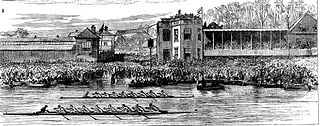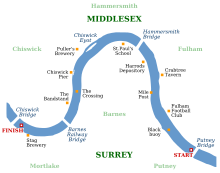
The 34th Boat Race took place on 24 March 1877. The Boat Race is an annual side-by-side rowing race between crews from the Universities of Oxford and Cambridge along the River Thames. The race ended in a dead heat, the only time the event has ended in such a fashion. Despite the formal declaration of a tie, Oxford believed that they were the victors. The controversy surrounding the result led to significant changes to the way in which the race was conducted including the introduction of finishing posts and former Blues as umpires.
The 33rd Boat Race between crews from the University of Oxford and the University of Cambridge took place on the River Thames on 8 April 1876. Six of the Oxford crew had Boat Race experience while Cambridge's crew contained three Blues. Umpired by Joseph William Chitty, Cambridge won the race "easily" in a time of 20 minutes 20 seconds, following confusion as to the positioning of the finish. The victory took the overall record to 17–16 in Oxford's favour.
The 15th Boat Race took place on the River Thames on 27 March 1858. Typically held annually, the event is a side-by-side rowing race between crews from the Universities of Oxford and Cambridge. The 1858 race, disrupted by poor rowing and a collision with a barge, was won by Cambridge, who defeated Oxford by 7+1⁄2 lengths in a time of 21 minutes 23 seconds.
The 17th Boat Race took place on 31 March 1860. Held annually, the Boat Race is a side-by-side rowing race between crews from the Universities of Oxford and Cambridge along the River Thames. It was the first time in the history of the event that the race had to be restarted as a result of an obstruction. Cambridge won the event by one length, in the slowest time ever.
The 18th Boat Race took place on the River Thames on 16 March 1861. Held annually, The Boat Race is a side-by-side rowing race between crews from the Universities of Oxford and Cambridge. The 1861 event, which featured the first ever non-British competitor, suffered numerous interruptions from river traffic. Oxford won by 16 lengths.
The 19th Boat Race between crews from the University of Oxford and the University of Cambridge took place on the River Thames on 12 April 1862. Oxford won by 10 lengths in a time of 24 minutes and 34 seconds, taking the overall record to 10–9 in Cambridge's favour.
The 21st Boat Race, an annual side-by-side rowing race between crews from the Universities of Oxford and Cambridge along the River Thames, took place on 14 March 1864. Umpired by Joseph William Chitty, Oxford won by nine lengths in a time of 21 minutes 4 seconds, the fastest winning time since the event was held on The Championship Course in 1845. The race, whose start was moved in order to avoid interruptions from river traffic, was witnessed by the Prince of Wales.
The 23rd Boat Race took place on the River Thames on 24 March 1866. The Boat Race is a side-by-side rowing race between crews from the Universities of Oxford and Cambridge. Oxford won by three lengths in a time of 25 minutes and 35 seconds, one of the slowest times in the history of the event.
The 24th Boat Race between crews from the University of Oxford and the University of Cambridge took place on the River Thames on 13 April 1867. In a race where the lead was exchanged several times, Oxford won by half a length in a time of 22 minutes and 39 seconds. The victory took the overall record to 14–10 in Oxford's favour.
The 25th Boat Race between crews from the University of Oxford and the University of Cambridge took place on the River Thames on 4 April 1868. Oxford won by six lengths in a time of 20 minutes and 56 seconds, taking the overall record to 15–10 in their favour. Oxford cox Charles Tottenham became the first person in the history of the event to win five Boat Races, and Cambridge saw their first non-British rower compete.
The 26th Boat Race between crews from the University of Oxford and the University of Cambridge took place on the River Thames on 17 March 1869. Oxford won by three lengths in a time of 20 minutes and 4 seconds. It was their ninth consecutive victory and was, at that point, the fastest time ever recorded in the event.

The 27th Boat Race between crews from the University of Oxford and the University of Cambridge took place on the River Thames on the 6 April 1870. Cambridge won by 1+1⁄2 lengths in a time of 22 minutes 4 seconds, their first victory since the 1860 race.
The 28th Boat Race between crews from the University of Oxford and the University of Cambridge took place on the River Thames on the 1 April 1871. The race, umpired by Joseph William Chitty, was won by Cambridge by one length in a time of 23 minutes 10 seconds for their second consecutive victory.
The 31st Boat Race took place on the 28 March 1874. The Boat Race is an annual side-by-side rowing race between crews from the Universities of Oxford and Cambridge along the River Thames. In a race umpired by former Oxford rower Joseph William Chitty, Cambridge won by three and a half lengths in their fifth consecutive victory.
The 35th Boat Race took place on 13 April 1878. The Boat Race is an annual side-by-side rowing race between crews from the Universities of Oxford and Cambridge along the River Thames. In total, ten former Blues took part in the contest. The race was umpired by former rower Joseph William Chitty and Oxford won by a margin of 10 lengths in a time of 22 minutes 15 seconds. The victory took the overall record to 18–16 in Oxford's favour.
The 47th Boat Race took place in 1890. Held annually, it is a side-by-side rowing race between crews from the Universities of Oxford and Cambridge along the River Thames. The race, umpired by former Oxford rower Frank Willan) was won by Oxford. They passed the finishing post one length ahead of Cambridge in a time of 22 minutes 3 seconds, and took their overall lead in the event to 24–22.
The 36th Boat Race took place on 5 April 1879. The Boat Race is an annual side-by-side rowing race between crews from the Universities of Oxford and Cambridge along the River Thames. Each crew contained four Blues. In a race umpired by former Oxford rower Joseph William Chitty, Cambridge led all the way, and won by a margin of three lengths in a time of 21 minutes 18 seconds. The victory took the overall record to 18–17 in Oxford's favour.
The 37th Boat Race, an annual side-by-side rowing race between crews from the Universities of Oxford and Cambridge along the River Thames, took place on 22 March 1880 following a postponement two days earlier as a result of thick fog. It is the only time in the history of the event that the race has been rescheduled. Oxford won by a margin of 3+3⁄4 lengths in a time of 21 minutes 23 seconds.
The 46th Boat Race took place on 30 March 1889. The Boat Race is an annual side-by-side rowing race between crews from the Universities of Oxford and Cambridge along the River Thames. For the first time in the history of the event, all eight rowers in the Cambridge crew had rowed the previous year. Cambridge won by three lengths in a time of 20 minutes 14 seconds, their fourth consecutive victory which took the overall record in the event to 23–22 in Oxford's favour.
The 78th Boat Race took place on 27 March 1926. Held annually, the Boat Race is a side-by-side rowing race between crews from the Universities of Oxford and Cambridge along the River Thames. Umpired by former rower Frederick I. Pitman, Cambridge won by five lengths in a time of 19 minutes 29 seconds in the largest winning margin since 1912. It was Cambridge's third consecutive victory and took the overall record in the event to 40–37 in Oxford's favour.





